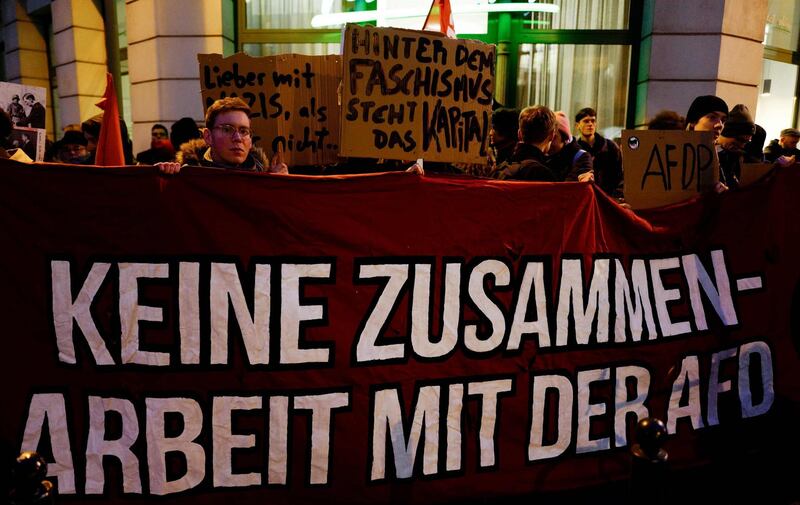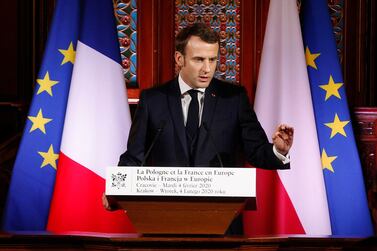Voting for regional premier in the tiny German state of Thuringia has concluded with a shock defeat for the incumbent Left party after far-right Alternative for Germany politicians united around a centre-right candidate.
The victory of Thomas Kemmerich, a politician from the economically liberal Free Democratic Party (FDP), by just one vote in the Thuringia state legislature thanks to support anti-immigrant AfD party has provoked outrage.
Mr Kemmerich leapfrogged incumbent Bodo Ramelow of the Left party to head the local state government after years of left-wing victories in the area.
"This is the first time in the history of modern Germany that a state premier has been elected with AfD votes," political scientist Andre Brodocz told broadcaster MDR.
The AfD's own candidate received zero votes, indicating the party's members aligned as a bloc behind Mr Kemmerich.
While the vote was secret, the final vote tally indicated the liberal candidate must also have enjoyed support from politicians belonging to Chancellor Angela Merkel's conservative CDU, as well as well as FDP colleagues.
German news media were quick to describe the event as a "political earthquake," as mainstream parties had so far refused to countenance working with the anti-immigration, anti-Islam and anti-EU AfD party at any level.
Addressing the local parliament in Erfurt, Mr Kemmerich sought to assuage concerns by insisting he would stick to a pre-election pledge not to work with the AfD.
"You have in me a bitter opponent of anything that even hints at radicalism, from the right or left, or fascism," he said, to jeers from local MPs and shouts of "hypocrite" and "charlatan".
People from across the political spectrum quickly condemned the tacit co-operation between CDU, FDP and AfD in social media posts.
"Every decent liberal should be ashamed that an FDP man has been elected with votes from the AfD," tweeted Hubertus Heil, federal labour minister from the Social Democratic Party (SPD).
Voices within the FDP were divided, with board member Marie-Agnes Strack-Zimmermann tweeting that the "unacceptable and unbearable" alliance made it a "bad day for me as a liberal".
But the party's deputy leader Wolfgang Kubicki welcomed Mr Kemmerich's election as state premier.
AfD co-leader Joerg Meuthen told the Frankfurter Allgemeine newspaper the vote showed there was "less distance" between the CDU, FDP and AfD than other parties, and illustrated the movement was part of a "middle class" majority.
It would be "understandable" if the AfD demanded ministerial jobs in Mr Kemmerich's government, he added.
Thuringia belongs to Germany's former communist east, where rejection of the far-right has not taken such deep roots as in former West Germany in the decades since the country's 1990 reunification.
As in other eastern states, the autumn 2019 election brought a surge there for the AfD.
Despite the gains made by the far-right, the policy of isolation against the AfD by Germany's political parties had meant incumbent state premier Mr Ramelow was widely tipped to be re-elected.
Despite the 2019 regional election robbing his coalition of absolute control in the state parliament, most observers had expected Mr Ramelow, a popular local politician, to win a simple majority.
Talks to find a possible majority coalition, rather than continuing with his weakened alliance of the Left party, the Social Democratic Party and Greens, were complicated by the national political picture.
The shock result in Thuringia is all the more surprising to observers as the AfD's leader there, Bjoern Hoecke, is one of the party's most radical figures, heading a loose movement within the party known as the "Wing".
He has in the past called for a "180-degree turn" in Germany's culture of remembrance for the Holocaust and other crimes of the Nazis, which form a central pillar of the country's post-World War II political life.
Wednesday marked a "new start for Thuringian politics," Mr Hoecke said, adding the AfD had helped stop it becoming a "left-wing state".
Central Council of Jews in Germany President Josef Schuster said in a statement he was "horrified" by Wednesday's vote.
"The FDP has quit the consensus among democratic parties not to work together with the AfD or to count on the far right's support," Mr Schuster said.








